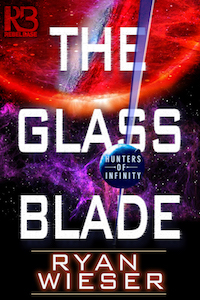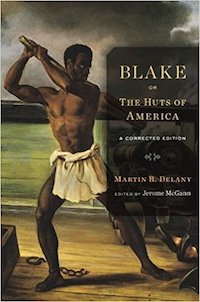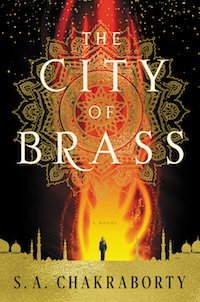Happy Friday, intrepid adventurers. This week includes reviews of Blake, or The Huts of America and The City of Brass, a primer for solarpunk, complete fantasy series, Afrofuturism, and more.
 This newsletter is sponsored by The Glass Blade, the first book in the brand new Hunters of Infinity series from Ryan Wieser.
This newsletter is sponsored by The Glass Blade, the first book in the brand new Hunters of Infinity series from Ryan Wieser.
The Hunters of Infinity, an elite brotherhood of warriors, have protected the galaxy for as far back as anyone can remember. When a fierce and enigmatic young woman named Jessop saves Hunter Kohl O’Hanlon, the brotherhood breaks tradition for the first time in their history and invites a woman into their elite training facility. But Jessop is hiding dark secrets and a mysterious past that may threaten not just the Hunters but the entire Daharian galaxy…
If you’re looking for a Sci-Fi space opera with a fierce female warrior then you can’t miss Ryan Wieser’s The Glass Blade!
International Women’s Day has passed, but this list of women writing in speculative fiction is still a great one! I’ve read eight of the 19 and hope to get to the rest ASAP.
What is solarpunk and should you care? I started seeing references to solarpunk for a few months ago, mostly in reference to international literature, and the LARB recently did a piece on it, so it looks like it’s gaining traction. The short version is that it is art, including fiction, that imagines sustainable futures; no dystopia here. There’s a reference guide on Medium that goes back to 2008, and has lots of interesting links. I’m hoping to dive in soon; I’ll keep you posted.
More South Asian speculative fiction: This post series continues, and I’m so excited! I’ve read a handful of these writers, but can’t wait to dive into more.
Let’s talk about Afrofuturism: Tochi Onyebuchi (author of Beasts Made of Night, which I thoroughly enjoyed) discusses the history, present, and future of Afrofuturism, including Black Panther, Janelle Monae, Nnedi Okorafor, and more.
Enough with cliffhangers! Looking for a series that’s already done? Here are some YA fantasy series that you won’t have to wait for.
Do you love Zelda? You might also love these Zelda-esque books.
Unicorns, unicorns, everywhere: And they can be yours! I’ll be over here drooling over those gorgeous prints.
Today in reviews, we’ve got a pair of cliffhangers. Sorry not sorry!
Blake, or The Huts of America by Martin R. Delaney
 I’ve been working my way slowly (VERY slowly) through Nisi Shawl’s Crash Course In the History of Black Science Fiction, and the first book on the list is Blake. I read it along with a group, albeit one in which everyone went at their own pace, which I highly recommend. It’s not an easy read, but it was a fascinating one.
I’ve been working my way slowly (VERY slowly) through Nisi Shawl’s Crash Course In the History of Black Science Fiction, and the first book on the list is Blake. I read it along with a group, albeit one in which everyone went at their own pace, which I highly recommend. It’s not an easy read, but it was a fascinating one.
Blake follows an escaped slave named Henry Blake through the southern United States and Cuba as he plots a massive insurrection and works to bring others into the cause. Originally published serially by Anglo-African Magazine and the Weekly Anglo-African, it was collected into book form in the 1970s. The writing style reminded me of nothing so much as The Count of Monte Cristo — it’s a very classical style, and one in which philosophical musings are given as much weight as the plot. Delaney also captures the various dialects of the time among the Southern inhabitants, which can take a bit of getting used to but is so effective at evoking the characters and settings. The planned ending is lost, which means that the book ends on an eternal cliffhanger: we’ll never know Henry’s fate, or that of his planned insurrection.
Delaney was an extraordinary person: born free, he was an African American abolitionist, the first black field officer in the US Army, and one of the first black nationalists. What makes his novel science fictional is its context: he started writing it in 1859, two years before the Civil War, and continued publishing it until 1862, well into the war. Envisioning a massive uprising of African Americans, as well as possible futures for them post-uprising, at that time in history, makes Blake a classic example of near-future fiction. For anyone looking to learn more about African American sci-fi, the history of slavery in America, and/or black literature in general, it’s an essential read. It’s also an engaging one; I was drawn in completely, and immediately went hunting for scholarship on possible endings as soon as I turned the last page.
The City of Brass (The Daevabad Trilogy #1) by S.A. Chakraborty
 One of these days I will get to a round-up of all the djinn/jinn/genie books that have come out in recent years; there are a bunch of great ones. This is one of the most recent, and definitely belongs on your TBR — it is a bona fide page-turner.
One of these days I will get to a round-up of all the djinn/jinn/genie books that have come out in recent years; there are a bunch of great ones. This is one of the most recent, and definitely belongs on your TBR — it is a bona fide page-turner.
Our protagonists are Nahri and Ali. Nahri lives on the streets of an alternate 1700s Cairo, making her way by her wits, her thieving skills, and a touch of healing magic. She’s smart, full of moxie, and very disillusioned with life generally, but she does have a dream: to save up enough to go to Istanbul and become trained as a full doctor. Her plans are interrupted, however, when in the course of faking a healing ritual, she accidentally summons a djinn. What’s more, the djinn believes that she’s the last scion of a murdered family and part djinn herself, and spirits her (heh) away to the city of Daevabad. This is all compicated by the evil ifrits pursuing them, of course. Ali is the second son of the king of Daevabad, a devout warrior raised to be his brother’s right hand. But he loathes the way that half-blood djinn are treated in the city, and trying to do something about it lands in him a heap of trouble. When their paths collide, it might bring down the entire kingdom.
I mentioned cliffhangers above, and this book ends on a steep one. But Chakraborty does a good job of balancing the introductory world-building and the action in this first installment, giving us a compelling mix and keeping the story moving. And speaking of world-building: the book is inspired by Muslim mythology and religion, and the author herself is a Muslim convert. This interview lays out both her inspiration and the writing process, and is worth a read.
And that’s a wrap! You can find all of the books recommended in this newsletter on a handy Goodreads shelf. If you’re interested in more science fiction and fantasy talk, you can catch me and my co-host Sharifah on the SFF Yeah! podcast. For many many more book recommendations you can find me on the Get Booked podcast with the inimitable Amanda.
Wakanda Forever,
Jenn